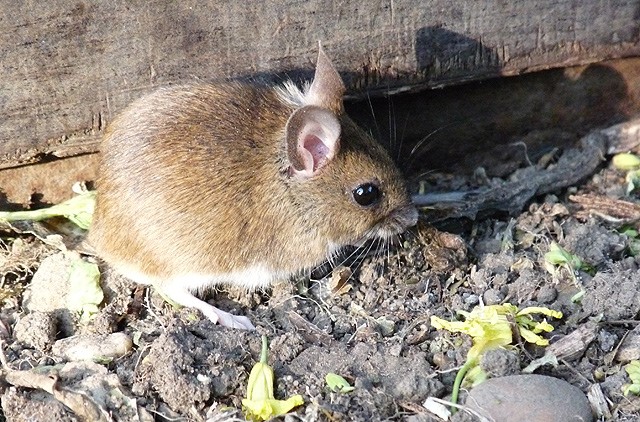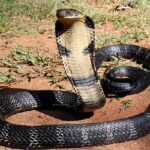The striped field mouse or meadow vole or wood mouse is a stout rodent found throughout much of North America. They have coarse brown fur with light gray or white undersides and are typically between six and seven inches in length, not including their tail length.
These little guys can be pesky pests and can often be found in fields, meadows, and gardens. They are particularly attracted to areas where there is an abundance of food, such as compost piles or bird feeders.
Differences Between Field Mouse and House Mouse
Striped field mice and house mice came from different genera and species. House mice(mus musculus) is a common pest that is found in both rural and urban areas where humans live, while field mice are native to Europe but have been introduced throughout the world.
Their physical features are different as well. The house mouse has brown-grey mouse-like fur, from head to tail with lighter color underneath, while field mice have brown-grey fur with a white or grey underside.
A house mouse has a hairless tail the same length as its body but it is thicker than a field mouse’s tails which are also the same length as their bodies. Their storing of foods is also different. House mice and field mice both store food, but field mouse stores near their nests, while house mouse doesn’t. Additionally, a house mouse’s smell is stronger than a field mouse.
Other than these, their droppings, nests, and the way they move around are all quite similar.

Fascinating Facts About The Field Mouse
The field mouse can be quite a pest but they can also be quite interesting. Read on to learn more about these little critters:
Field Mice are Highly Adaptable Rodents
Mice are incredibly adaptable creatures and the field mouse is no exception. They have been introduced to many different parts of the world and have successfully adapted to a wide range of habitats, from forests to urban areas.
Their agility and flexibility allow them to survive and be more courageous in exploring new areas and environments. This makes them particularly successful as pests. They can fit through small holes, cracks, and crevices to gain access to buildings or homes. Their fur makes them look bigger so they can scare off some predators. They use their urine to mark their territory.
They Have an Excellent Sense of Hearing
Even though they don’t have good eyesight, field mice have excellent hearing along with a strong sense of smell. Their large auditory bullae allow them to hear sounds at frequencies up to 70 kHz and their thin incisor teeth can be used as a crude diaphragm for sound reception. This makes them particularly sensitive to high-frequency noises and able to detect the presence of predators from far away. Mice species communicate with each other through ultrasonic calls, which are only audible to other mice.
They’re Fast!
Field mice can run up to six miles per hour, making them one of the fastest small rodents in the world. This high speed allows them to escape from predators quickly and also helps them when they’re foraging for food. Mice can use their whiskers to sense if the surface they’re running on is slippery or if there are obstacles in their way.
They also use it to sense changes in airflow and use this information to navigate through tunnels or other confined spaces more efficiently. The speed of a field mouse is around 8 mph and is equivalent to a human running 160 mph.
Field Mice are Amazing Climbers
There are only some animals that can climb rough surfaces like field mice. They have specially adapted claws that allow them to cling onto surfaces like bark and leaves. Their tail also helps them as they can wrap them around objects to give them more stability while climbing. This allows them to climb trees and other high places to find food or evade predators.
Another thing that makes them great climbers is their ability to travel across power lines. They can grip onto the wire with their claws and walk along with it, allowing them to cross large distances in a short amount of time.
They’re Also Great Swimmers
Not many people know this but field mice are also great swimmers. In fact, they can swim up to a kilometer in open water. This allows them to travel between different islands and habitats or escape from predators.
They’re Nocturnal
Like most other rodents, field mice are nocturnal and prefer to forage for food at night. This makes them difficult to spot during the day and also means they are more active when humans are less likely to see them.
At night, they can move around without fear of being seen and can better avoid becoming prey themselves. While field mice will forage for food in a variety of places, they tend to be most active at dusk and dawn.
They Have Very Short Life Expectancies
Field mouse has a very short life expectancy. In the wild, they only live for around six months and in captivity, they usually only live for about a year up to 2 years. This is because of the many dangers that they face such as being preyed on by other creatures, getting diseases or injuries, and becoming lost.
Field mice sexually mature after three weeks. Despite their short lifespans, field mice can produce up to 16 litters of offspring in a year, with 4-7 baby mice with each litter. This helps ensure that their populations stay high, even though most of the young mice die soon after they’re born.
Other Things to Know About Field Mice
Physical Appearance
Field mice are the smallest type of mice species. They have small bodies with brown fur on their backs, while the belly is usually gray or white. People often mistook a field mouse for a normal mouse or a rat, as they didn’t know the difference between rats and mice.
Behavior
These field mice are more agile than other types of mice. They prefer to browse on the ground for food and they are very quick in escaping danger by darting into holes or burrows which is why when you set a trap it’s a good idea to put it near one of these hiding places.
Habitat
Field mice prefer to live in fields, meadows, and open woodlands. They build their homes in burrows that they dig themselves, or they will use the abandoned nests of other creatures. A typical burrow has the main entrance that is used by all members of the colony, and a series of smaller tunnels leading off from it. These mice prefer to live in grasslands where there are plenty of seeds, fruits, and berries for them to eat.
Diet
Field mice are omnivores, meaning they eat both plants and animals. They have a very diverse diet that includes everything from fruits to insects. Their favorite foods are grains such as oats and corn, but they will also eat seeds from trees like oak or maple and some types of weeds. And if there is a shortage of food in the wild, they will also eat insects or other small animals.
Reproduction
Mice live in colonies, a female mouse can have up to six litters of young a year, with each litter containing around four or five babies. The baby mice are born naked and blind, and it takes them about three weeks to start looking like adults. They reach sexual maturity at around two weeks old, and the life span of a wild these mice is usually around one year.
How Destructive Are Field Mice
Field mice can be found in the yard, under trees, or even inside your house. These rodents can enter your home through tiny openings and they can quickly reproduce and soon you will have a full-blown infestation on your hands.
The field mouse is very destructive, and it can cause a lot of damage to the inside of a home. They chew on wires that can lead to electrical fires and they also burrow in insulation which will make it less effective at keeping heat out during the summer months. Diseases like salmonella or hantavirus can spread by exposure to rodent droppings, particularly those of the deer mouse.
Keeping them out of your home is quite difficult, it is not just a one-time fix. You have to continuously check your property for any potential entryways and seal them up. And if you do find an infestation, it is best to call a professional who can help remove them.
How to Prevent Field Mouse From Entering Your Home
It can be difficult to keep wood mice out of your home once they get in because these critters can fit into such tiny spaces. They will use any opening, no matter how small, to get into your house. But there are a few things you can do to help prevent them from getting in in the first place:
- Seal up any openings that they might be able to get through, including cracks in the walls, holes in the roof or floor, and spaces around pipes and wires.
- Use a mousetrap to catch them if they are living inside your house.
- Keep your house clean and free from any crumbs that might attract them in the first place.
How to Get Rid of Field Mouse
The best way to catch a wood mouse is with a mousetrap. Others would employ rodenticides but I do not suggest that because it poisons the environment and everything in it.
Setting a mousetrap
- Place the bait (usually cheese or peanut butter) in the middle of the trap.
- Tie the bait to the trigger so that it will be pulled when the mouse tries to get to it.
- Attach the bait to a stick and place it next to the trap.
- Set the trap on the floor near where you have seen the mice running or nesting.
- Make sure to place the trap in an area where there are no other animals that might get hurt if they trigger it. You also don’t want to put it in an area where kids or pets can accidentally come in contact with it.
Professional Field Mouse Control
If you hear the sound of mice in your attic and start seeing mouse droppings around the house, it is time to call a professional rodent control company. These companies have the experience and knowledge to get rid of mice quickly and safely.
AAAC Wildlife Removal is a licensed, bonded, and insured company that specializes in rodent control. We offer a variety of services including inspection, removal, trapping, and more! Contact us today to schedule an appointment or discuss your needs with one of our expert technicians.
Originally published on https://aaacwildliferemoval.com/blog/mice/field-mouse-facts/














